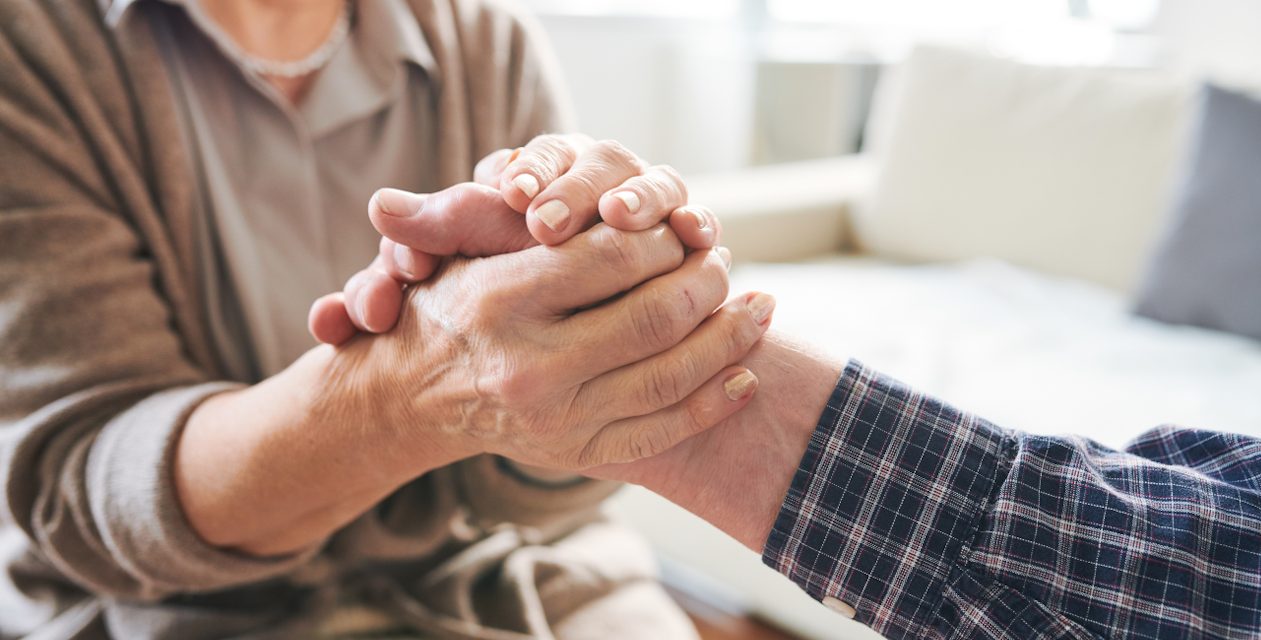By Mary Eileen Finch
Her smile was the first thing I noticed when I started volunteering at the facility where she resided. I was nervous, it being my first day, but her sweet face stood out above all the others and I was drawn to her.
She was sitting at her favorite spot, near the picture window where she could roll her wheelchair up close to the glass and look at the scenery. She patted her soft white hair back into place as she stared out the window, always conscious about her appearance. She looked up as I walked near and said, “Hello dear, I’m Rose, and you are?”
After assisting the group with a bread-making activity, I followed her back to her room where she showed me photos of her family. She didn’t know their names or their relationship to her but knew that they had meant something to her. I noticed that photos were covered in dust and that the clothing styles were very outdated. This saddened me — after years of interacting with the elderly I recognize all the signs of family abandonment. I picked up a card that proudly sat next to her bed and read the inscription, “Happy Birthday, Mom. Sorry I can’t be there this year but soon. Love, Rob.” It was dated five years earlier. There were no other cards after that one.
I don’t judge. Alzheimer’s is a horrible disease that can be hard to face at times. I’ve seen loved ones break down and bawl in the hallway after visiting their parents’ room. Seeing someone who used to care for you being reduced to a child with no memory of who you are is difficult. Once the advance stages are reached, and your loved one is abusive, angry, and hurtful for no apparent reason, it’s often easier to avoid that kind of emotional pain, telling yourself that she doesn’t know you anyway. Every week I would walk into the common room and see Rose sitting by the window. Every time she would look up at me and say, “Hello dear, I’m Rose, and you are?” At first, I would always reply with “I’m Mary, a volunteer.” She would smile and ask how I was doing or where was I from. I would answer her, always giving the same replies every day, as she did not remember me. She was always polite but seemed indifferent to my presence.
One day as I arrived, I noticed that Rose wasn’t gazing out her window like usual; she was watching another resident interact with his family. He had a grandchild upon his knee and a son by his side. They were all laughing and carrying on. I saw a tear slowly slide down her wrinkled cheek. It could have been a symptom of her allergies. I wasn’t sure if she even had the ability to understand emotions or grasp the concept of her own alienation, but I know that it hurt me to think that she was so alone, even if she didn’t know that herself. So when I walked up to her and she said, “Hello dear, I’m Rose, and you are?” I took her hand in mine, looked her in the eyes and said, “I’m you’re granddaughter. I apologize that’s it’s been so long, but I’ve been overseas and just now returned. I’m eager to share my adventures with you.”
She gasped and yelled, “My stars! I’ve been wondering where you’ve been!”, and she laughed and begged me to tell her everything. So I did. I created one thrilling escapade after another, and she giggled at my tales and shook her head at my folly. I had never seen her so alive; she didn’t glance out her window once. When it was time for me to go, she hugged me close and asked me to tell my mother, her daughter, to come visit her. I promised her I would.
The next week when she greeted me with her, “Hello dear, I’m Rose, and you are?”, I smiled and said I was her daughter. She cried. I’m not sure if she even had a daughter, as the only photos in her room were of a son, but that’s not what mattered. What was important was she knew, on some level, that family was important. Any family. So I became her family. Each week I would slip into character and act out a role for her. Did she ever remember these people the next week? No. But should that be reason to deny her? Don’t we all desire to be loved, even if for a moment? For half an hour every week she felt loved by a granddaughter or a long lost aunt or a secret love of her third cousin twice removed. Every female in her made-up family tree paid her a visit that year. I’ll never forget her gentle, “Hello dear, I’m Rose, and you are?”, nor the way her eyes would light up when I would tell her I was there just for her.
I remember one of the last times I visited her, right before her dementia worsened, and she was moved to end of life care. I was having a horrible day, hating myself and feeling uncertain about where I was going in life. My brain was tired and not up to acting so when I heard her state, “Hello dear, I’m Rose, and you are?”, I sighed and said, “I’m just me, Rose, and nothing else.” She patted my hand and replied, “That’s nice dear. That’s the best thing to be isn’t it? I’m Rose. And I like being me. You should enjoy being you.”
How right she was! To this day, 15 years later, whenever I think life is hard and that it’s so difficult to be who I am . . . I think of Rose.









Wow! I also live in an assisted living community in East Tennessee. Seeing Dementia every day is a hard condition to accept, especially those you visit daily. Just saw a very dear friend of mine today talking about someone I had no idea who he/she was talking about. But, I listened to the story with interest and LOVE. Yes, the key word is LOVE. As we have been taught from childhood-LOVE ONE ANOTHER. This is a powerful lesson to show LOVE, even to those we don’t know on a personal basis, yes we all need to be loved and to SHOW love to our neighbors. Thank GOD ! Alzheimer’s May destroy our minds BUT it can not destroy our SOUL-and LOVE comes from the soul. Just remember to keep loving one another as taught when we were children! It goes a long ways-A LIFETIME.